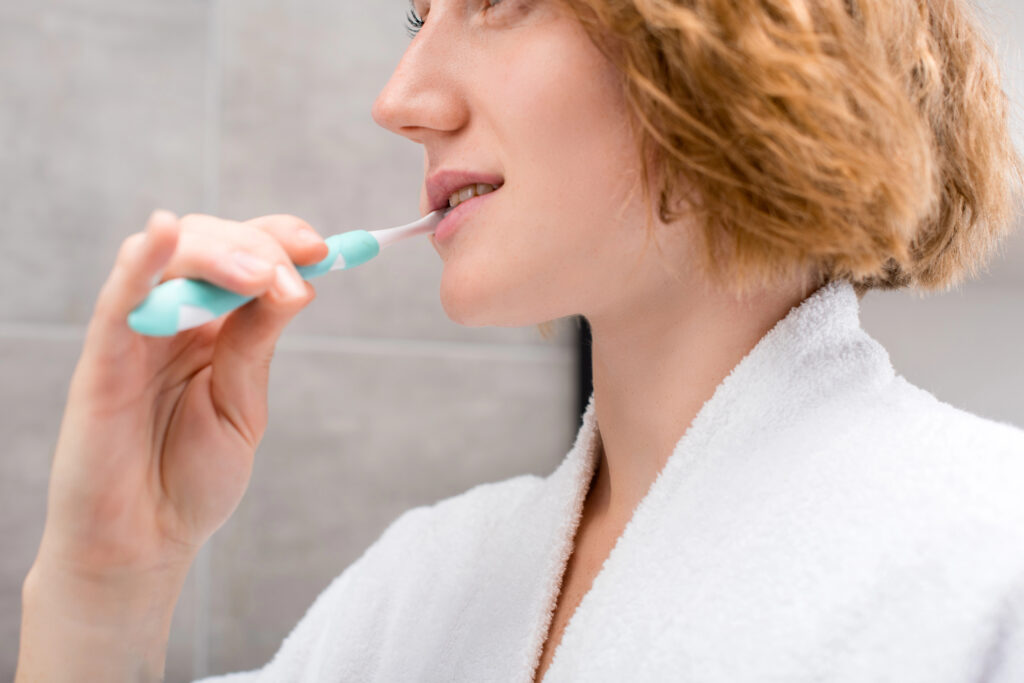
Brushing your teeth is a no-brainer, right? Most of us think of brushing as a good, even great, habit. We are frequently told how vital brushing is for keeping teeth clean, breath fresh, and gums healthy. But is it possible to have too much of a good thing? When it comes to brushing your teeth, the answer might surprise you.
The Benefits of Brushing
Brushing your teeth helps remove food particles and plaque (sticky bacterial buildup on the surfaces of teeth that can lead to bad breath, cavities, and gum disease). The American Dental Association recommend brushing twice a day for two full minutes with fluoride toothpaste to optimal oral health.
While it’s easy to see why brushing is so important, you should also understand that too much – or too vigorous- brushing may not necessarily equate to a healthier smile.
The Risks of Over-Brushing
While brushing is great for cleaning teeth and keeping your gums healthy, excessive brushing or brushing incorrectly can have the opposite effect, potentially harming enamel and gums.
Enamel Erosion
Your enamel is the hard, protective outer layer of your teeth. While it’s incredibly durable, over-brushing can wear it down over time, which may leave your teeth more vulnerable to sensitivity and decay. Using a medium or hard-bristled toothbrush or applying too much pressure while brushing can also cause the enamel to erode.
Tooth Sensitivity
If enamel or gums are worn away due to over-brushing, your teeth may become more sensitive to hot, cold, or sweet food and drink, an issue that can be uncomfortable and indicative of underlying issues.
Gum Damage
Aggressive brushing can also irritate your gums and make gums more susceptible to gum disease or even gum recession. Gum recession occurs when gum tissue begins to pull back from the teeth, exposing the roots. Once gum tissue is lost, it doesn’t grow back.
Signs You May Be Brushing Too Much
It can be hard to know when you are brushing too much, especially since you want to be sure to brush enough. Here are some signs that you may need to adjust your routine.
- Bleeding Gums: If your gums become swollen, feel tender, or bleed regularly, it may be a sign of overbrushing.
- Tooth Sensitivity: As we mentioned, sensitivity to cold or hot food, drinks, or even air might be connected to overly aggressive brushing.
- Worn Bristles: If your toothbrush bristles are frayed and flattened within a few weeks, you might be pressing too hard or brushing too frequently.
Tips for Balanced Brushing
Finding the right balance for brushing involves understanding how long, how often, and how hard to brush. Here’s how to ensure you’re brushing just enough:
Stick to the 2×2 Rule
The ADA and most dentists recommend brushing your teeth two times per day for two minutes. This is enough time to clean your teeth thoroughly without overdoing it. While adding an extra minute or brushing more frequently on occasion is perfectly fine, regularly brushing much beyond this baseline could be detrimental.
Use the Right Toothbrush
Choose a soft-bristled toothbrush. Hard bristles may sound like they will clean better, but they can also scrape enamel and irritate gums. A soft-bristled brush is gentler while still effective at removing plaque.
Perfect Your Technique
Hold your toothbrush at a 45-degree angle to your gums. Use small, circular motions to clean teeth along the gumline and all tooth surfaces. Think of gentle polishing rather than harsh scrubbing.
Don’t Skip the Rest of Your Oral Routine
Brushing is just one part of maintaining oral health. Floss daily and consider using mouthwash to get to spaces your toothbrush might miss. If you do feel like you need to freshen up but feel you might be brushing too much, try swishing with water or chewing sugar-free gum.
Visit Your Dentist
Regular dental checkups are a great chance to get advice on your brushing technique. We can check for worn enamel and answer questions about specific concerns like sensitivity or gum health. If you have questions about whether you might be brushing too much – or too little – ask at your next visit!